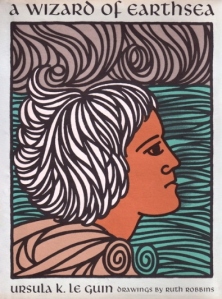 The Left Hand of Darkness is the first book I’ve read of Le Guin, and it is great. Big parts of it read more like a fantasy adventure about friendship, set on a barren world. It combines a sense of wonder with a few original ideas, an emotional ending, and, at times, beautiful prose.
The Left Hand of Darkness is the first book I’ve read of Le Guin, and it is great. Big parts of it read more like a fantasy adventure about friendship, set on a barren world. It combines a sense of wonder with a few original ideas, an emotional ending, and, at times, beautiful prose.
I have three minor quibbles…
First, it could have explored in more detail the consequences of living and evolving on an arctic world. Le Guin manages to do so to a certain extent, but I have the feeling she could have done a whole lot more.
Secondly, Le Guin should have been able to write about the gender neutral inhabitants of Gethen as truly gender neutral. The inhabitants come across too much as just men without a sex drive 4/5th of the time. Their feminine and neutral sides aren’t explored that much, or worse, they’re depicted stereotypical – like the fact that they see no shame in crying. A couple of times it is simply stated that this or that in their society is a result of them not being “men” (there is no war), but that isn’t really felt in most of their actions (there is murder due to political rivalry), nor in the structures of the societies Le Guin created. As such, this is not the important gender book some claim it to be, I’d even say not even seen in its historical context, but I can understand why it would seem that way from a superficial point of view. On the other hand, I guess the book might have had some effects back in the days, opening up a few readers to other ways of thinking, and as such contributed to certain discussions society was having, and is still having right now.
Finally, some of the characters could have been fleshed out a whole lot more, such as the king, Tibi and Obsle. This would have enhanced the emotional impact of the book even more.
Had Le Guin invested a bit more in the characters and the world-building, and put some more thought and research in the links between climate, biology, gender and society, she could have pulled off a book that would have been extraordinary – and that probably would have meant a bit more pages to fill. If she had done so, TLHOD would have been the true Arctic brother of Dune.
150 pages in, I kind of settled on ‘it’s a good book’, but the emotions I felt at the end convinced me that this is actually an excellent novel. That’s no mean feat. The Left Hand of Darkness is a highly enjoyable, intriguing read, and very much recommended. A classic indeed, more so, one that has aged well.
originally written on the 19th of January, 2015
Consult the author index for my other reviews, or my favorite lists.
Click here for an index of my non-fiction & art book reviews, and here for an index of my longer fiction reviews of a more scholarly & philosophical nature.
 Some 17 years after Le Guin completed the original Earthsea trilogy, she returns to the isle of Gont. This time she focuses on Tenar from The Tombs of Atuan, but also Sparrowhawk remains an important character, and Arren from The Farthest Shore plays a part as well.
Some 17 years after Le Guin completed the original Earthsea trilogy, she returns to the isle of Gont. This time she focuses on Tenar from The Tombs of Atuan, but also Sparrowhawk remains an important character, and Arren from The Farthest Shore plays a part as well.
 You Should Come With Me Now features 42 short stories written between 2001 and 2015. About half of those are very short, about half a page, and previously appeared on M. John Harrison’s
You Should Come With Me Now features 42 short stories written between 2001 and 2015. About half of those are very short, about half a page, and previously appeared on M. John Harrison’s 







